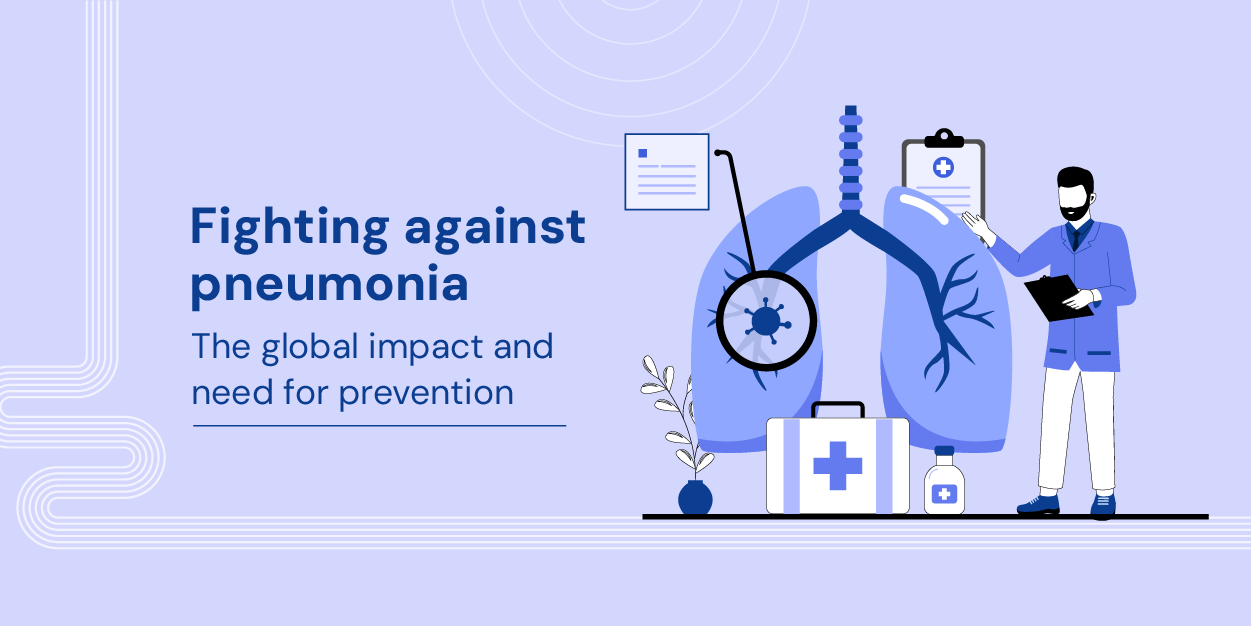Pneumonia is one of the leading global health concerns, contributing to morbidity and mortality. It is one of the principle causes of neonatal deaths and attributed to high mortality rates, especially in developing countries characterised by low healthcare infrastructure. The infection usually occurs in the lungs, inflaming the air sacs and causing effusion, which limits the ability of lungs to expand fully and exchange oxygen efficiently.
Who is at risk?
The risk factors for pneumonia include:
- Age: Babies less than 2 years of age are more prone to the conditions due to developing immune systems. Also, older adults with weakened immune system and underlying health conditions such as asthma, respiratory syncytial virus infection, cystic fibrosis and bronchitis are also at risk
- Environmental Risks: Individuals who are regularly exposed to pollutants, chemicals and poultry processing.
- Poor Lifestyle Habits: This includes heavy smoking and alcohol intake which weakens the immune system and increases the risk.
Challenges in Pneumonia Diagnosis
Pneumonia can result from bacterial, viral, or fungal infection. Streptococcus pneumoniae and Haemophilus influenzae are the most common causes of severe pneumonia cases, often in young children. Diagnosing these infections can be difficult, especially in areas with limited medical resources and standardised equipment. However, despite these challenges pneumonia can still be prevented through effective strategies.
Strategies to Prevent Pneumonia
- Vaccination: Pneumococcal vaccines are effective in preventing pneumonia. Recommended for persons older than 65 years and for children under the age of 2 years. Always consult your doctor to determine the appropriate type of vaccine for you and your child.
- Hygiene Practices: Hand washing, covering the mouth and nose while coughing or sneezing and ensuring a clean-living environment helps to reduce the spread of respiratory infections that cause pneumonia.
- Healthy Lifestyle: Regular exercise, consuming a proper meal and avoiding smoking and alcohol stimulates the immune system, reducing susceptibility to infections.
- Avoid Getting Exposed with Sick People: Most of the respiratory infections are transmitted via micro-particles present in environment or upon the surfaces that are frequently touched.
- By avoiding engaging with individuals who are unwell will greatly impact in reducing the risk of respiratory infections and potential onset of pneumonia.
- Preventing Exposure to Pollutants: Reduction of exposure to air pollution and second-hand smoking can minimise lung irritation and lower the risk of pneumonia.
- Continuing to Care for Existing Problems: If a person has respiratory infections such as the flu, asthma, bronchitis, or chronic obstructive pulmonary disorder, it is critical to properly manage these conditions. Regular checks and adherence to prescribed treatments can greatly reduce the risk of related problems, such as pneumonia.
Some of Necessary Actions to Combat Pneumonia by Healthcare Authorities Include:
- Standardising the system of healthcare delivery operations.
- Ensure that all children and vulnerable people receive adequate pneumonia vaccinations.
- Promote excellent nutrition, hygiene, reduce air pollution and exposure to lower the risk of pneumonia.
- Raising awareness and understanding of pneumonia prevention and treatment.
- Increased availability of antibiotics, pulse oximetry, and oxygen therapy.
Comprehensive prevention and management are important to combat pneumonia, reduce global impact and improve health outcomes especially in vulnerable populations.
-Content partner Happiest Health









